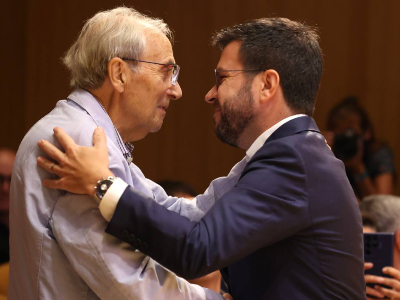- The head of the Executive opened the event commemorating the 25th anniversary of the Universal Declaration of the Collective Rights of Peoples

The President of the Generalitat, Pere Aragonès, this afternoon reaffirmed the right to self-determination “as an inalienable right of every nation” and stressed that “Catalonia, like all other peoples and nations of the world, will never, never, never renounce its rights as a people”. “It will be whatever its citizens choose to be”, he stated.
The head of the Executive pronounced these words during the event commemorating the 25th anniversary of the Universal Declaration of the Collective Rights of Peoples, organised by CIEMEN (Escarré International Centre for Ethnic Minorities and Nations). Pere Aragonès emphasised that since the adoption of this declaration “the cause for the freedom of our nations has progressed; it has not yet been consummated, but very important historical milestones have been achieved”.
During his speech, the president pointed out that, as the Declaration explains, “it is the people who must establish themselves as subjects of collective rights” and noted that “this is the great change that has taken place in Catalonia in the last 25 years”. He recalled that in 1998 “the Catalan pro-independence movement was still a minority everywhere, and today, 25 years later, we are the majority in the Catalan Parliament, we govern the country and we have a consolidated presence in all the town councils”. “It is present across the board in Catalan society as a whole”, he concluded.
In this context, he remarked that “today independence holds the key to the governability of the state, and this gives us tremendous strength to defend the interests of our people”. He therefore called for “this opportunity to be seized upon to make possible all that has not yet been possible, with amnesty as a starting point”.
During the ceremony, the head of the Catalan Government expressed his gratitude to the promoters of the declaration for “the work, commitment, endeavour and know-how of an entire generation that laid the foundations for this shared struggle for the freedom of peoples”. He made special reference to Aureli Argemí, president emeritus of CIEMEN, whom he defined as “an example of endeavour and commitment”.
Universal Declaration on the Collective Rights of Peoples
The Universal Declaration of the Collective Rights of Peoples defines, through 24 articles, the concept of a people (a human community with common references to a culture and a historical tradition) and recognises its national and international rights in various areas such as the right to exist, to self-determination, to self-government, to the free exercise of sovereignty, to develop its culture and language, to make use of the natural resources within its own territory, to be fully recognised, to establish relations and unite with other peoples, to solidarity and to legal recourse, among others.
Although the initial text of the Universal Declaration of Collective Rights of Peoples was approved during the 2nd Summit of the Conference of European Stateless Nations (CONSEU), organised by CIEMEN in Barcelona in May 1990, eight years later, the organisation saw the need to update the text in a new context marked by the fall of the Soviet Union and the emergence of various national emancipation processes, both in Europe and in other parts of the world, which would ultimately lead to the creation of new States. For this reason, the Declaration was updated in 1998 during the 3rd CONSEU Summit, held in Barcelona, which celebrates its 25th anniversary in 2023.